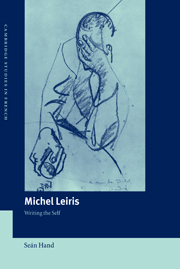Book contents
- Frontmatter
- Contents
- Acknowledgements
- List of abbreviations
- Introduction: the deaths of Michel Leiris
- PART I TEXTS AND CONTEXTS
- PART II THE QUEST FOR PRESENCE IN LA RÈGLE DU JEU
- 6 Excess of joy: the beginnings of presence in ‘ … Reusement!’
- 7 Organs of learning: sensing presence in Biffures
- 8 The act of union: being-in-the-world in La Règle du jeu
- 9 Thanatography: non-being as the limit of autobiography
- Conclusion: locating Leiris
- Notes
- Bibliography
- Index
9 - Thanatography: non-being as the limit of autobiography
Published online by Cambridge University Press: 22 October 2009
- Frontmatter
- Contents
- Acknowledgements
- List of abbreviations
- Introduction: the deaths of Michel Leiris
- PART I TEXTS AND CONTEXTS
- PART II THE QUEST FOR PRESENCE IN LA RÈGLE DU JEU
- 6 Excess of joy: the beginnings of presence in ‘ … Reusement!’
- 7 Organs of learning: sensing presence in Biffures
- 8 The act of union: being-in-the-world in La Règle du jeu
- 9 Thanatography: non-being as the limit of autobiography
- Conclusion: locating Leiris
- Notes
- Bibliography
- Index
Summary
Non-being marks the limits of autobiography. Chronologically, this is a truism, but the phrase serves to emphasize the most important of La Règle du jeu's philosophical and technical limits. Leiris writes about death in three major ways: on the most obvious level of content, his autobiographical discourse constantly lists and discusses instances of death as an important part of the awareness of one's own temporality; more fundamentally, La Règle du jeu revolves philosophically about the unknowable, unlivable personal death at its heart; and most particularly in Leiris, this content and philosophy are both affected by Leiris's consideration of autobiography's technical splitting of the self, a process reflected in the operations and movements of the biffure.
I have already chronicled death as content when discussing the obsessive return of the fall in Leiris's autobiographically oriented narratives, and the philosophical interpretation given to these falls can be thought of here at the same time: the historical context and the philosophical reaction may differ from book to book, but the fundamental content and philosophy concern the threat to Leiris's being. Beyond the level of this discourse, however, it is technically that La Règle du jeu most radically reveals the figure of the fundamental death existing already within the operations and the sign of self-presence. Here the philosophical and the technical limits of La Règle du jeu confirm one another.
- Type
- Chapter
- Information
- Michel LeirisWriting the Self, pp. 185 - 201Publisher: Cambridge University PressPrint publication year: 2002



